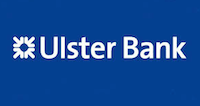The Central Bank of Ireland said it fined Ulster Bank Ireland DAC, a unit of Royal Bank of Scotland, €3.325 million “in respect of anti-money laundering and terrorist financing failures.”
The Central Bank reprimanded Ulster Bank Ireland for breaches of the Criminal Justice (Money Laundering & Terrorist Financing) Act 2010 (the CJA 2010).
The Central Bank said the breaches have been admitted by Ulster Bank Ireland.
The CJA 2010 requires credit and financial institutions to adopt and implement adequate policies and procedures appropriate to their business to prevent and detect the commission of money laundering and terrorist financing.
The Central Bank said the breaches happened over a six year period, from enactment of the CJA 2010 on July 15, 2010 until 2016.
The Central Bank’s director of enforcement, Derville Rowland, said: “Ulster Bank Ireland’s breaches are especially concerning as they point to unacceptable weaknesses in key aspects of its anti-money laundering framework, systems and controls over an extended period of time.
“As one of the largest retail banks in Ireland, Ulster Bank Ireland provides a gateway to the financial system for more than one million customers through its extensive network of branches, online and telephone banking.
“Therefore, it is imperative that it vigorously applies the highest levels of anti-money laundering compliance in order to protect, not only itself, but its customers and the wider financial system.
“Firms play a vital role in assisting An Garda Síochána and the Revenue Commissioners in their investigation of money laundering and terrorist financing through the detection and reporting of suspicious activity.
“This case also highlights that firms who outsource must have in place appropriate controls to oversee outsourced activity, which must be documented and clear.
“This is even more critical where the outsourcing is within the group because these situations tend to foster a misplaced sense of complacency regarding regulatory compliance.
“Of course, the effectiveness of such controls is contingent upon a firm’s commitment to observing them.
“When the Central Bank identifies a failure to deal with these risks we will not hesitate to enforce compliance.
“The fine imposed on Ulster Bank Ireland demonstrates that the Central Bank will take action where anti-money laundering frameworks and controls are not sufficiently robust.
“The enforcement of anti-money laundering governance and controls is and will continue to be a priority for the Central Bank.”
